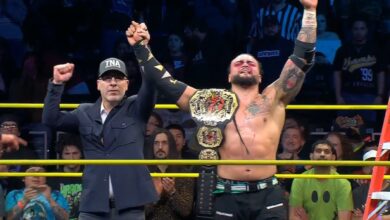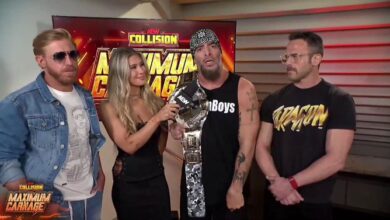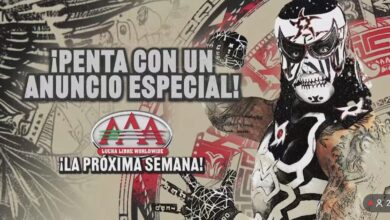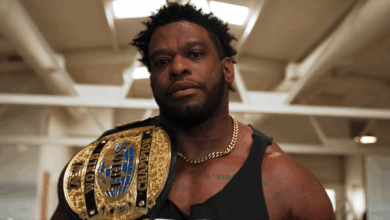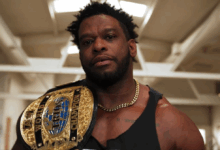Jon Moxley: Strength Outside of the Ring
This week, All Elite Wrestling (AEW) founder and CEO Tony Khan announced on Twitter that superstar Jon Moxley had voluntarily entered an inpatient treatment center for alcohol. Prior to the announcement, Moxley, whose real name is Jonathan Good, was scheduled to face Orange Cassidy in the semifinals of AEW’s world champion eliminator tournament Wednesday night on “AEW Dynamite.”
The news has been met with an outpouring of support for Moxley and his family from fans and wrestlers around the world. Moxley’s wife, Renee Paquette, acknowledged the encouragement in a tweet on Wednesday, saying, “Thanks for this outpouring of support. Jon is every bit of the badass we all know him to be. I couldn’t be more proud of him for getting to proper help he needs, and being given the space to put his health first. Couldn’t possibly love this man more.”
As a lifelong wrestling fan, and a big supporter of Jon’s, having followed his career since his time in Florida Championship Wrestling (FCW), NXT, and World Wrestling Entertainment (WWE), I too join the echoes of encouragement for Moxley and his family. I say this as a recovering alcoholic myself.
Just over two years ago, September 6, 2019 to be exact, I put down the bottle after deciding that enough was enough and being sick of hangovers, lies, arguments, and addiction. For nearly a decade, I had been a binge drinker, which slowly evolved into an alcohol addiction, in which I was unable to function without booze in my life. I would hide bottles throughout my house, taking “secret shots” when my wife or children were not around. I would stop by the liquor store on the way home from work, downing two or three mini bottles before making it to my house, only to attempt to cover the smell of the alcohol with a beer as soon as I walked into the kitchen. My life was centered around alcohol and knowing when I would have my next drink. I was trapped, I was enslaved, and I couldn’t escape.
Even going to wrestling events like NXT house shows on the Florida circuit or conventions, I would get drunk before going and would sneak in mini bottles when I knew the venue did not serve alcohol. You could often see me on the front row of Raw or Smackdown when the cameras panned by, and in my hands you would always see a beer, never letting the cup empty before going back to concessions to buy another.
It all came to a head in September 2019 when I decided my hangover that morning was going to be my last. I could not keep living like this. Either I was going to die or kill someone. I was losing time with my family and losing my sanity. I was no longer living in the moment and it had to stop. I started attending alcoholic support meetings, got a sponsor, and began my journey to sobriety.
Often I am asked, why did you drink so much? What made you become an alcoholic? It’s a question not easily answered, but the short response is stress from my career, stress from family life, and believing that I was escaping the realities of life through persistent intoxication. I can only imagine that Moxley was feeling the same way. The pressures of performing week in and week out for thousands of fans, a new baby, a new book, and the constant stress of living up to the expectations of others – Jon probably felt as though alcohol was his escape, his way to mask pain, mask resentments, and to leave the world when he did not want to be present.
I do not know Jon Moxley personally, although I have met him several times backstage at previous WWE events. But I know the man he is, because I too have been that man and have experienced where he is in his life. The support that he is receiving right now from his family, the AEW locker room, and fans around the world, are exactly what he needs in this moment. Without the support and encouragement I received from my wife, children, and friends, I doubt I would be alive today.
The way Tony Khan has handled this situation publicly is to be commended as well. In his announcement that Moxley was entering rehab, Khan also provided information for those who might also need help, tweeting, “If you or a loved one need help, please reach out to SAMHSA’s National Helpline: 1-800-662-HELP (4357).” I share the sentiment of Khan, and encourage any person who believes they may have a drinking problem or are struggling with alcohol, to please get help. It’s ok to not be ok. Help is available. Alcohol and drug addiction has taken too many wrestling stars prematurely, including notables like Chyna, Miss Elizabeth, Buzz Sawyer, Test, Mr. Perfect, Matt Osborne (Doink), and Lance Cade. If they had received help, perhaps they would still be with us now.
Undoubtedly, Mox has a tough rough ahead – it’s not easy to get sober and to maintain sobriety, but we know he is one tough son of b*tch and if anyone can beat their demons, it’s Jon Moxley. Whether he returns to the ring one day or takes a different course in life, I’m grateful for his willingness and vulnerability to get help and share his life with us. May this be a moment we can all self-reflect and continue to rally together as wrestling fans, encouraging those fighting addiction. Wrestling is a family.
About the author: Travis Akers is a lifelong wrestling fan, veteran Navy intelligence officer, political commentator, and columnist for Hola Sober magazine. He has been an opinions contributor for Newsweek and made appearances in Buzzfeed, Washington Post, and CNN. You can follow him on Facebook and Twitter at @travisakers.
